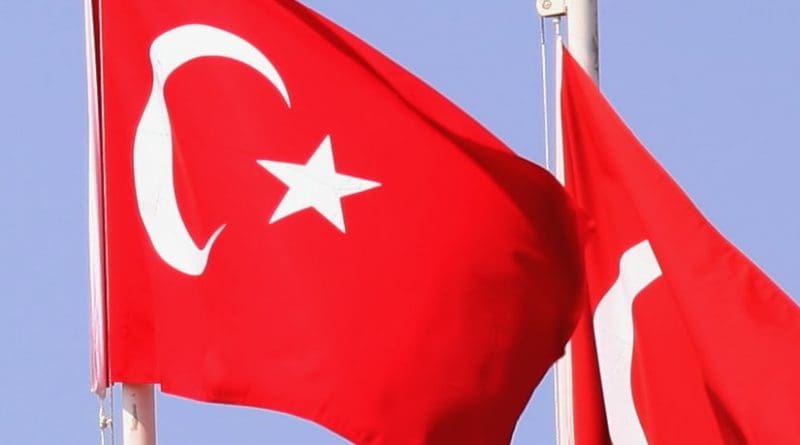Growing Turkish Influence among Gagauz Threatens Russian Interests
By Paul Goble
Turkey’s use of “soft power” among the 250,000 Gagauz living in the former Soviet space – 140,000 in Moldova, 40,000 in Ukraine, and 12,000 in Russia itself – represents a growing threat to Russian interests not just in Moldova but across the entire Black Sea region, according to a Russian analyst.
In a commentary on the portal of the Center for Strategic Assessments and Predictions, Vladislav Gulyevich says that the Turkic-speaking but Orthodox Christian Gagauz have been a target of Turkish influence campaigns for almost 20 years, an effort that is bearing fruit and that threatens Moscow’s interests in major ways (www.csef.ru/studies/politics/materials/933/).
The first indication of Ankara’s success was the Gagauz decision to change the alphabet they used from one based on Cyrillic to the Latin script, a change that not only distanced them from the Russians but increased their ties with Turkey, the language of which is very similar to Gagauz.
In 1995, the first Turkish delegations arrived in Gagauzia in Moldova, and they included “not only politicians but also public activists and representatives of Turkish cultural and educational institutions.” As a result, the first Society of Turkish-Gagauz Friendship appeared, a group with links to numerous Turkish foundations.
And then in 2000, Gulyevich continues, the National Assembly of Gagauzia approved the opening of a representative office in Turkey and reached agreement with Ankara about the elimination of Turkish entry visas for residents of the autonomy, a step that mattered because of the increasing number of Gagauz studying in Turkey.
Komrat University, the main Gagauz higher educational institution, has partnerships with five Turkish universities and sends “about 60 students” a year to study there on Ankara-financed scholarships. According to Gulyevich, there are discussions about establishing similar programs for Gagauz students at Baku State University and in several Central Asian schools as well.
Perhaps even more important, there are as many as 50,000 Moldovan citizens in Turkey, “the majority of whom are Gagauz.” At the same time, there is now a Turkish Cultural Center in Komrat as well as a Turkish gymnasium, all organized by TIKA, the Turkish Administration for Cooperation and Development.
TIKA’s Moldovan office is in Chisinau, and certain members of its staff, Grigulyevich continues, are thought to be “activists of various Turkish radical organizations like the Gray Wolves who based themselves in Gagauzia even before the disintegration of the USSR.” Members of that group, he says, also fought for Chechen independence.
Russian analysts have devoted some attention to the Gagauz of Moldova, but Ankara has been interested in the Gagauz elsewhere as well. TIKA now has a special department for the Gagauz of Ukraine, and, again according to Grigulyevich, “the Turkish side constantly positions Gagauzia as a political-economic phenomenon separate from Moldova.”
Ankara not only includes Gagauz representatives from Ukraine in Turkish measures of various kinds but both broadcasts to them in their own language and provides school textbooks for the Gagauz of Ukraine, textbooks which promote the idea that the Gagauz are part of the Turkish world rather than the Slavic one.
All of this effort toward a small nationality many have not heard of is part of Ankara’s effort to transform the Black Sea into “an inner sea of the Turks,” an effort that might be countered by the rise of Greater Romania, something unlikely given Gagauz attitudes, or by expanded Russian efforts among the Gagauz, measures not now on the horizon.
Consequently, despite the historical sympathies of the Gagauz for Russia and Russians, the current leadership of Gagauzia in Moldova “does not hide its sympathies for Ankara.” That does not mean it is opposed to Russia, but over time, Turkey is certainly gaining the upper hand with its various “soft power” programs including highway building.
Indeed, “an entire generation of young people has grown up [in Gagauzia] who recognize perfectly well who is providing real help to the autonomy and its population,” Turkey but not Russia. And that sets the stage at a minimum for conflicts between Russia and Turkey and in the longer term for a fundamental shift in the geopolitical balance of the region.
Moreover, Grigulyevich continues, while Turkish efforts among the Gagauz are not yet explicitly anti-Russian, there is every chance that they will become so, just as they have already in Ankara’s outreach to the Crimean Tatars. At present, Grigulyevich says, Moscow could do something about this, but in the near future, it may be “already too late.”
“Russia must increase its economic and humanitarian presence in Gagaguzia,” he concludes. “The force of inertia has a tendency to dissipate, and then the vacuum will be filled by others. Whether then there will be a place for us is a rhetorical question,” especially if the Gagauz accept the Turkish slogan of “a united Turan, from Chukotka to the Balkans.”


Very interesting article from this gentleman who worked for the CIA, Voice of America, Radio Liberty and other America government departments.
I would also be interested in looking up the progress of the 40 million Kurds to achieve independence. With the development and control of gas and oil in Northern Iraq, the stage is set for greater demand for independence this time with financial backing.
I am gagauzian girl and I want to say, that athor oh this article make too much mistakes. Hi wrote this article, but his posotion is not correct. Abolutely.